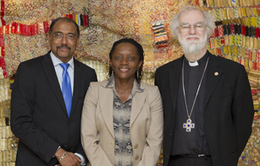Ecumenical and International Development gatherings in Geneva

Thursday 1st March 2012
The Archbishop of Canterbury travelled to Geneva for a three day visit (27th February – 1st March) to meet the World Council of Churches and United Nations agencies, to engage in high level dialogue on ecumenical and development-related issues.On arrival the Archbishop shared an evening at the Ecumenical Institute at Bossey with senior staff of the WCC and other agencies that share the Ecumenical Centre in Geneva. The following day, after giving a homily at morning worship in the Ecumenical Centre, he participated in several roundtable meetings: first, on the work of the Faith and Order Commission and especially its convergence text The Church, and also on preparations for the Unity Statement for the 2013 World Assembly in Korea. Later in the day a similar roundtable focussed on the challenges facing the Christian churches in the Middle East, and especially around Jerusalem and Bethlehem, and their efforts for the common good of their societies. Other meetings focused on future opportunities for closer collaboration between the Church of England and the WCC.
The culmination of his visit to the Ecumenical Centre was a major intervention on “Human Rights and Religious Faith”, given to a large audience drawn from ecumenical, diplomatic and UN constituencies across Geneva. He called the 1948 Universal Declaration of Human Rights "a landmark in the history of moral consciousness" and reflected on ways to reconnect the discourses of human rights, faith and culture:
"I believe this reconnection can be done by trying to understand rights against a background not of individual claims but of the question of what is involved in mutual recognition between human beings. I believe that rights are a crucial way of working out what it is for people to belong together in a society."
The following day the Archbishop met with the Director General of the World Health Organisation, Dr Margaret Chan, to discuss the significant contribution to the prevention and treatment of disease across the world made by Anglican health institutions and outreach programmes, including the Anglican Health Network. He also met with the Executive Director of UNAIDS, Michel Sidibé and UNAIDS staff, as well as members of UN Plus – the group of UN staff living with HIV. The Archbishop stressed that HIV-related stigma and discrimination must be overcome and pointed to the valuable contribution made by faith leaders living openly with HIV. He affirmed the Anglican commitment to the global AIDS response which works towards universal access to testing, treatment, care and support. He also also highlighted the progress of the We Will Speak Out Coalition, launched in 2011 with UNAIDS and a number of faith-based entities, which works through local faith communities, seeking to end sexual violence and support survivors. During the staff meeting at UNAIDS, the Archbishop emphasised the importance of listening to the voices of those directly affected:
"There has to be the encouragement of listening to the experiences of those who have undergone sexual violence and those living with HIV and AIDS, accompanying them and allowing them the appropriate space to speak about their experiences."
Earlier in the day, the Archbishop participated in a debate, organised by the Ecumenical Advocacy Alliance, on the right to food and the right to access to HIV treatment. He concluded the discussion by emphasizing the important role faith communities can and should play in building community resilience in addressing the issues:
"I would hope that, given faith communities are in place before, during and after crises, that they are included and given the help they need to overcome barriers and be key levers."
He later met with the High Commissioner for Refugees, Mr António Guterres, to explore opportunities for closer collaboration with faith communities in the protection of displaced peoples. The Archbishop was the guest of honour at a dinner with members of the diplomatic core, hosted by the UK Mission to the United Nations, which provided an opportunity to discuss the issue of children in armed conflict. The Archbishop reflected on the role of local faith communities in protecting and supporting children affected by conflict, referring to his recent visit to Eastern DRC.
Before departing Geneva, the Archbishop met with the High Commissioner for Human Rights, Ms Navanethem Pillay. He discussed the current and potential role of faith communities in protecting the rights of vulnerable groups, including children. The Archbishop affirmed the roots of the human rights vision in faith understandings of human dignity and justice.
Reflecting on his trip, the Archbishop commented that "the whole work of the United Nations is one of the bearers of hope for a deeply anxious and suffering globe."
